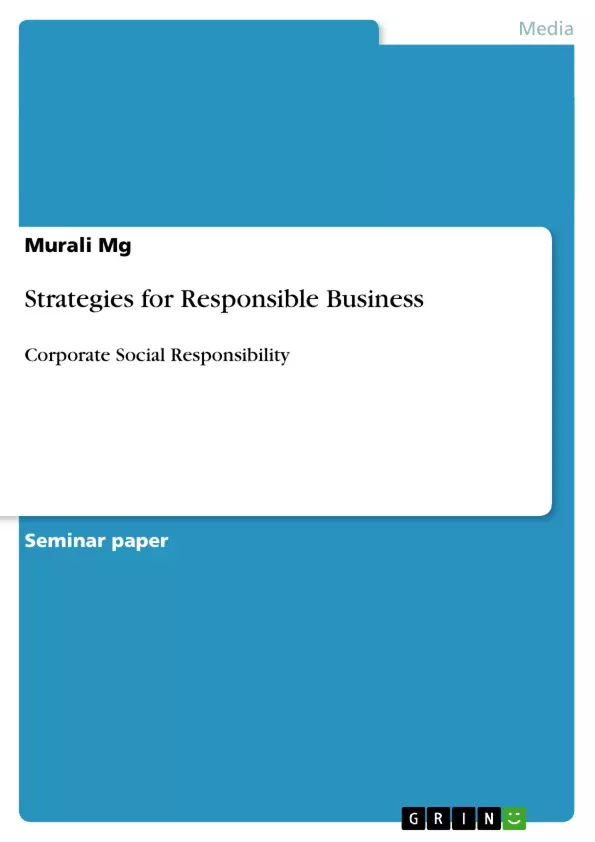Corporate Social Responsibility is a traditional concept which has existed since before the World War II, (A.B. Caroll & K.M. Shabana). The evolution of concept theoretically relates to Abram’s (1951), who argued that companies should not only focus on profit maximisation, but also should think about its employees, customers and public at large; which was further discussed in seminal book “Social Responsibilities of Businessman” published by Howard R. Bowmen in 1953.
Corporate Social Responsibility, when simplified signifies the social responsibilities of a corporate firm. According to the International Organisation for Standardisation (ISO), CSR is described as “a balanced approach for organisations to address economic, social and environmental issues in a way that aims to benefit people, communities and society”. CSR takes major issues that include human rights, workplace and employee issues, unfair business practices, organisational governance and environmental practices into consideration. Corporate social responsibility is a conceptual where firms tries to integrate social and environmental concerns into their business and operations and in their interaction with their stakeholders on a voluntary basis which as stated by the European commission. Companies as engage business and activities, their certain objectives will be directed towards the society which is likely to improve societal image monetarily as well as non-monetarily, contradictorily not all companies engaging in CSR looks out for monetary outcomes. Organisations like NGO’s engage in CSR to improve the welfare of the society.
Inhaltsverzeichnis (Table of Contents)
- Introduction
- Literature Review
- Corporate Social Responsibility: A varied perspectives
- CSR-What they can do
- Methodology
- Case Study Analysis: Evidence
- Conclusion
Zielsetzung und Themenschwerpunkte (Objectives and Key Themes)
This report aims to explore the relationship between corporate social responsibility (CSR) and corporate outcomes. It examines the motivations for companies to engage in CSR, investigates the potential benefits and challenges associated with CSR practices, and analyzes relevant case studies to illustrate the impact of CSR on profit and brand image. The report culminates in a discussion of the limitations and criticisms of CSR in the current business environment.
- Definition and Evolution of Corporate Social Responsibility
- Motivations for Companies to Engage in CSR
- Benefits and Challenges of CSR Practices
- Impact of CSR on Corporate Outcomes (Profit and Brand Image)
- Limitations and Critiques of CSR in the Modern Business Context
Zusammenfassung der Kapitel (Chapter Summaries)
The report begins by introducing the concept of corporate social responsibility (CSR) and outlining its historical development. The chapter explores the various perspectives on CSR, highlighting the evolution of the concept from its early focus on philanthropy to its current emphasis on integrating social and environmental concerns into business operations. Key figures such as Abram (1951) and Howard R. Bowmen (1953) are discussed, who argued that companies should prioritize societal well-being alongside profit maximization.
The literature review delves deeper into the definition and scope of CSR. It examines various perspectives on the concept, drawing on prominent researchers like Sethi (1997), Zadek (2000), McGuire (1963), Carroll (1979, 1991), Harvard Business School, Kotler and Lee, and McWilliams and Seigel. These perspectives highlight the various dimensions of CSR, including social responsiveness, corporate social performance, corporate governance, philanthropy, and community involvement. The chapter also explores Kotler and Lee's (2005) 5 Cs of CSR, emphasizing the importance of conviction, commitment, communication, consistency, and credibility in achieving positive CSR outcomes.
The methodology section outlines the research approach used in the report. It highlights the use of case studies and journal articles to analyze the impact of CSR on corporate outcomes. This section provides a framework for the subsequent chapters, where specific case studies are examined.
Schlüsselwörter (Keywords)
The primary keywords and focus topics of this report are: corporate social responsibility (CSR), profit maximization, brand image, stakeholder engagement, social and environmental concerns, ethical business practices, case study analysis, benefits and challenges of CSR, limits and critiques of CSR.
Frequently Asked Questions
What is Corporate Social Responsibility (CSR)?
CSR is a balanced approach for organizations to address economic, social, and environmental issues to benefit society while operating their business.
How has the concept of CSR evolved?
It shifted from simple philanthropy to a strategic integration of social concerns into core business operations and stakeholder interactions.
What are the "5 Cs" of CSR?
According to Kotler and Lee, they are Conviction, Commitment, Communication, Consistency, and Credibility.
Does CSR always lead to higher profits?
The report analyzes the relationship between CSR and corporate outcomes, showing it can improve brand image, though monetary outcomes vary.
What are some criticisms of modern CSR?
Critics often point to its use as a mere marketing tool or the lack of standardized implementation across different industries.
- Quote paper
- Murali Mg (Author), 2013, Strategies for Responsible Business, Munich, GRIN Verlag, https://www.grin.com/document/272985



